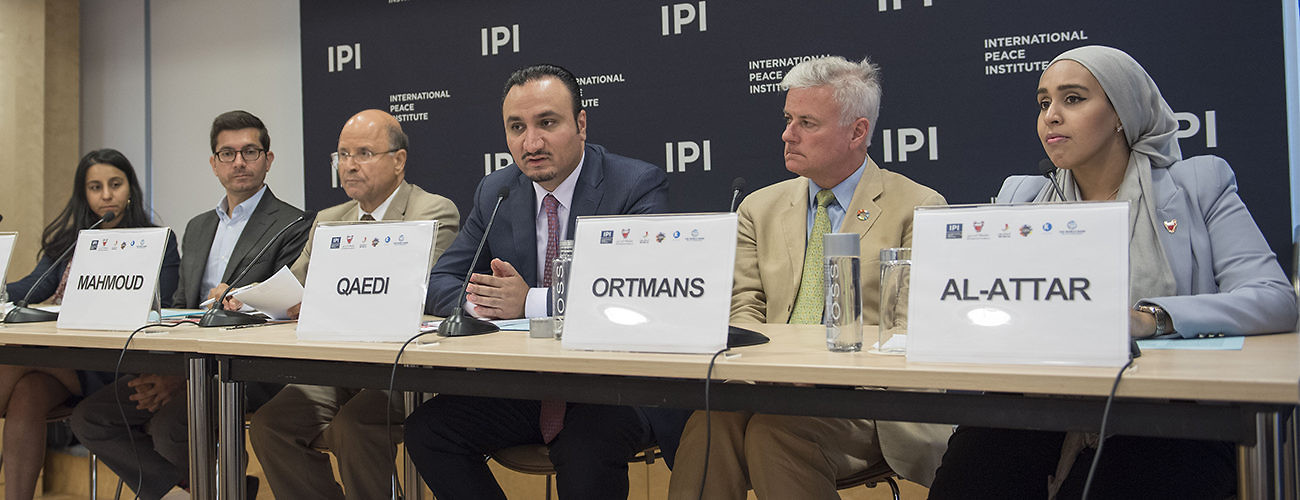“The UN has strongly endorsed entrepreneurship as an important means of accelerating the SDGs,” IPI Senior Adviser Youssef Mahmoud declared, moderating a July 16th discussion at IPI on the role of entrepreneurship and innovation in the realization of the social and economic gains envisioned by the Sustainable Development Goals. “Entrepreneurship plays an important role in creating jobs, driving economic growth, addressing environmental challenges, and enabling youth to turn that creative energy into ideas,” he said.
Jonathan Ortmans, Founder and President of Global Entrepreneurship Network (GEN), recalled that just ten years ago “in Silicon Valley, you did everything you could to be polite to the people that lived in Washington DC, and in government, but essentially you felt that they were irrelevant. They were unimaginative, rather gray characters with wool suits and ties, and they certainly didn’t represent the energy and the vigor that you found in your own local startup ecosystem. That’s now changed.” The nature of the new private-public relationship is best captured, he said, in a frequent comment of America Online (AOL) co-founder Steve Case. “At the beginning of every speech, he would say, ‘If you are an entrepreneur and you are not following public policy, forget it.’”
The panel discussion, a side event to the High-Level Political Forum on Sustainable Development, was organized by IPI in partnership with the Kingdom of Bahrain, Tamkeen, the Kaufman Foundation, the World Bank and GEN and focused on ways private entrepreneurship was being redirected for social good.
Nasser Qaedi, Chief Investment and Marketing Officer of Bahrain-based Tamkeen, explained the word tamkeen means enablement and empowerment in Arabic. He said the semi-autonomous government agency had been created to help the private sector become the main engine of Bahrain’s growth as the country transitioned from an oil-based economy in a “key paradigm shift.”
Through public consultations, Tamkeen ensures its initiatives adapt to the needs of citizens, development objectives and what’s happening in the market, he said. “It’s very important to make sure that the private sector is fully involved and engaged in that process.”
Mr. Ortmans described “a new era,” with the public-private relationship closer than ever before. “It’s no longer about public-private partnerships in my view,” he said. “I think we’ve even moved beyond that, it’s an era where public sector institutions, whether it be governments, and indeed NGOs, have become symbiotically connected to entrepreneurs.”
Mr. Ortmans said entrepreneurs were uniquely poised to support the SDGs because of the intermingling of cultures through their constant communications across borders. Entrepreneurs are “building communities that can build trust, and I think that’s a very important currency,” he said.
Panelist Victor Mulas leads the agenda on innovation and entrepreneurship in cities for the World Bank. He highlighted innovations enabled by the internet, in areas from energy to mobile payments, but warned of a possible downside, due to misuse of data. “We are seeing global platforms emerging, and with some of them, we have some concerns with privacy and use of data, right? So how can we avoid the dark side?” he asked.
To combat this, governments are now using technology to access better data about public goods. Actors like Google, Facebook, or Amazon have “better data, and more instrumental data,” he said, so it will be important “to share those resources in a trusted environment to work for development.”
Lana Baqer Al-Attar, the Founder of Gudjuju, a self-described “digital agency that empowers good”, said, “We make a lot of profit while still being socially good. I do notice that people are more likely to invest in businesses that are socially good.”
Sameeksha Desai, Director of Knowledge Creation and Research in Entrepreneurship, Kauffman Foundation, said listening to entrepreneurs was the first step in serving them. This year, the foundation launched a “knowledge challenge” to bring “impactful actionable research” to entrepreneurs.
Partnerships, Dr. Desai said, “are an extremely important part of learning.” As information technology makes quickly sharing information easier, the foundation aims to keep the “feedback loop” with its partners open. “We’re constantly moving on from one problem, generating knowledge, using that knowledge to address the problem, and then continuing with the next problem,” she said.
The event was moderated by IPI Senior Adviser Youssef Mahmoud, with welcoming remarks from Safa Sharif Abdulkhaliq Mohammed, Manager of Corporate Planning at Tamkeen.








